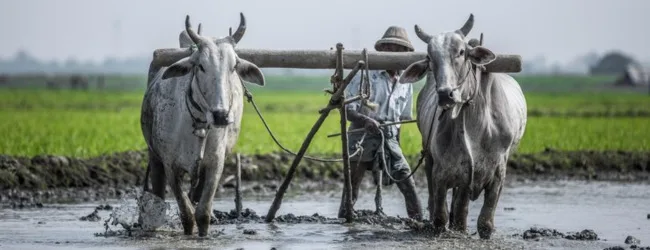Table of contents
Natural farming vs organic farming is one of the most debated topics in Indian agriculture today. Both aim to produce food that’s free from chemicals and safe for consumption, but the methods, costs, and philosophies behind them are completely different. Understanding these differences is essential if you’re a farmer, entrepreneur, or just someone curious about healthy food and sustainable farming.
What is Natural Farming?

Natural farming is a chemical-free, zero-budget farming method where crops are grown without plowing, tilling, or using fertilisers and pesticides.
Key Concept: Coined by Subhash Palekar in India, natural farming believes that “nature knows best.” The idea is to replicate natural forest ecosystems on the farm.
Core principles of natural farming:
- No plowing or tilling (soil remains undisturbed)
- No use of chemical fertilisers or compost
- No weeding using chemicals
- Use of Jeevamrutha, Beejamrutha, and Mulching
Global parallel: Similar to Masanobu Fukuoka’s “do-nothing farming” in Japan.
ALSO READ | The Benefits and Basics of Natural Farming in India
What is Organic Farming?

Organic farming avoids synthetic chemicals but relies on composting, green manures, crop rotation, and organic inputs to grow crops.
Key Concept: Focuses on maintaining soil fertility and biodiversity while avoiding harmful pesticides.
Core practices of organic farming:
- Soil cultivation and plowing
- Use of organic fertilisers like cow dung, vermicompost
- Bio-pesticides instead of chemicals
- Certification process required (e.g., NPOP in India)
ALSO READ | Indian organic farming: a vision for a healthy country
Natural Farming vs Organic Farming: 6 Key Differences
Here’s a comparison chart for a quick and clear understanding:
| Feature | Natural Farming | Organic Farming |
|---|---|---|
| Main Focus | Mimicking nature’s ecosystem | Enhancing soil fertility through organic inputs |
| Soil Tilling | Not allowed (no disturbance to soil) | Allowed (plowing is common) |
| Fertilizers Used | None; uses Jeevamrutha, Mulching | Organic compost, cow dung, vermicompost |
| Cost of Cultivation | Very low (almost zero-budget) | Moderate to high (due to organic inputs) |
| Certification Needed | No certification required | Requires certification (e.g., NPOP, USDA Organic) |
| Prominent Guru | Subhash Palekar | No single founder; guided by global standards |
Real-Life Examples from India
- Andhra Pradesh Community Managed Natural Farming (APCNF): 7 lakh+ farmers adopted natural farming; chemical input cost dropped by 80%.
- Sikkim – India’s first organic state: Achieved 100% organic certification; shows state-level implementation of organic farming.
- Palekar Natural Farming: Spread to over 30 lakh farmers across India due to government promotion.
Advantages & Disadvantages: Comparison Table
| Aspect | Natural Farming | Organic Farming |
|---|---|---|
| Advantages | – Zero cost (no external inputs) – Eco-friendly & sustainable – Improves soil biodiversity – Low water requirement | – No synthetic chemicals used – Builds long-term soil fertility – Premium pricing in markets – Easier to scale for large farms |
| Disadvantages | – Initial yields may be low – Requires deep understanding of local ecology – Limited awareness among consumers – Slower market penetration | – Initial yields may be low – Requires a deep understanding of local ecology – Limited awareness among consumers – Slower market penetration |
💡 Pro Tip: If you want to start a Business but have too many doubts, connect with a Business expert from Boss Wallah for guidance – Check Out
Cost Comparison: Natural vs Organic Farming
| Cost Factor | Natural Farming | Organic Farming |
|---|---|---|
| Input Cost (per acre) | ₹500–₹1,000 | ₹8,000–₹15,000 |
| Certification | Not required | ₹25,000+ over 3 years |
| ROI (3rd year onwards) | High | High (if certified) |
Government Support & Subsidies
- Natural Farming:
- Supported by NITI Aayog and the Indian Council of Agricultural Research (ICAR)
- APCNF (Andhra Pradesh) model is fully government-supported
- Organic Farming:
- Paramparagat Krishi Vikas Yojana (PKVY) by the Ministry of Agriculture
- MOVCDNER for the North Eastern Region
- 30%–50% subsidy on inputs & training
Need Expert Guidance?
Starting a business can be challenging, but you don’t have to do it alone! At Boss Wallah, our 2,000+ business experts are ready to provide valuable insights and guidance. Whether you need help with marketing, finance, sourcing, or any other area of any business, our business experts are here to help you succeed
Confused about Which Business to Start?
Want to start your own business but unsure which one to choose? Explore Boss Wallah, where you’ll find 500+ courses by successful business owners, featuring practical, step-by-step guides on starting and growing various businesses.
Find your perfect business idea today
Conclusion
When it comes to natural farming vs organic farming, both practices aim to offer healthier, safer, and sustainable food. The choice between them depends on your goals, farm size, budget, and access to markets. For low-cost, local solutions, natural farming is ideal. For certification and premium product markets, organic farming works better.
Frequently Asked Questions (FAQs)
1. What is the main difference between organic and natural farming?
Organic uses compost and plowing; natural farming avoids both.
2. Is natural farming better than organic farming?
It depends—natural is cheaper, but organic has better market access.
3. Can I make a profit with natural farming?
Yes, especially after the first 1–2 years when soil fertility improves.
4. Is certification required for natural farming?
No. Organic farming requires certification; natural farming does not.
5. Who started natural farming in India?
Subhash Palekar, with his Zero Budget Natural Farming (ZBNF) model.
6. Does natural farming give high yields?
Initially low, but yield stabilises and can increase over time.
7. Is natural farming sustainable?
Yes, it enriches soil, saves water, and promotes biodiversity.
8. Are subsidies available for both farming methods?
Yes, under the PKVY and APCNF programs.
9. How long does organic certification take?
Usually 3 years under Indian standards (NPOP).
10. Can I grow cash crops with natural farming?
Yes, but careful planning is needed based on climate and soil.


